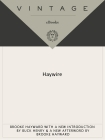Haywire, Brooke Hayward [the best ebook reader for android TXT] 📗

- Author: Brooke Hayward
Book online «Haywire, Brooke Hayward [the best ebook reader for android TXT] 📗». Author Brooke Hayward
“Mother,” I asked, somewhat anxiously, “what are we giving Tarquin for his birthday?”
“Umm,” said Mother, squinting at Tarquin, “let’s see. Tarquin,” she kicked off her shoes and squatted down, making herself no taller than he—she never liked to address children from any height at all—“tell you what. If you can guess exactly what it is—one guess is all you get—then, by gum, that’s what we’re giving you for your birthday.”
Tarquin cocked his head with interest and dangled his foot thoughtfully in the water. “A watch,” he answered, his voice rising with hope, “a real wristwatch!”
Mother shook her head sadly. “Uh-uh. ’Fraid that’s way off. What we’re giving you is much more special than a watch, something that nobody else has. How would you like”—Mother gave me a wink and stood up—“a darling little roly-poly bug?” She opened her hand and there, in the crack of her palm, was a potato bug, rolled into a tight gray ball.
“Oh, no!” cried Tarquin. “You’re teasing me!”
“Why, Tarquin,” said Mother, “don’t you have any idea what wonderful pets roly-poly bugs make? You can take them anywhere.”
“Phew!” said Tarquin. “All I want is a wristwatch. Are you teasing me, Maggie?” Mother began to laugh, and for the rest of the morning he followed her around the pool, not quite sure what to anticipate at his party that afternoon, but politely hoping for the best.
After Jill and he left, Mother carefully placed the potato bug between two layers of cotton in a small empty bracelet box, which she then wrapped as a gift. “Don’t worry,” she told me conspiratorially, “he’ll open this and be horrified, but it’s just a joke—I’ve already sent over his real birthday present.”
Bridget and I carried the box to the party, my chest throbbing with both delight and fear. Tarquin was standing regally—taller and more handsome than he’d ever been before—silhouetted against the pastel party dresses of what seemed to be hundreds of admirers fluttering on the steps of the house. It was an awful moment. I handed him the box, betraying him, my first love. His face was radiant with joy; the size of the box clearly indicated there was something precious inside. I squeezed my eyes shut, praying that the potato bug had somehow changed into a wristwatch, but it hadn’t—he lifted the top layer of cotton and there was the little gray ball. Mute, Tarquin stared at it, while all our friends shoved and pushed each other for a look. Bridget and I were humiliated; there was no way to explain. Fortunately, the real present was quickly produced and we were restored to favor. As a result of this episode, I immediately wrote a poem entitled, “When You Kiss Me, Kiss Me with a Smile.”
Bridget, Bill, and I knew that we were the envy of all our friends because we lived in our own house, apart from our parents. The Barn was ours, it belonged to us, every inch of it had been created with us in mind. We derived an enormous sense of pleasure from the possession of something so large, a house, entirely tooled to meet our needs. We were aware that ours was a unique situation. It was satisfying to feel superior to and different from anyone else our age, to be envied by all our peers because we could make as much noise as we wanted and bicycle and roller-skate and pull wagons around our own private living-room floor. The Barn was an ideal playhouse.
But sometimes we longed to know what it was like to live like other children, in one house, surrounded by family. And sometimes late at night, I would wake up—feeling alone—and quickly check to make sure there was light filtering through the crack under my door. One time the crack was dark, and I called, Emily, Emily, Emil-ee. When she didn’t come, I was so frightened I forced myself to feel my way downstairs and outside, to traverse the breezeway to The Other House on tiptoe, inch by inch, because I thought the wind rustling the mottled leaves of ivy was alive, a weasel or a fox breathing through the vines as he followed my passage. When I came to the other side—The Other House—although it was only thirty feet away, I felt that at last I had reached civilization after a very dangerous journey through the wilderness. I found Emily in the kitchen, exactly where I thought she would be, chatting with Elsa and Otto over a cup of coffee. They all made a big fuss over me and I forgave Emily because she let me snuggle on her lap—the best place I ever sat—with a cup of cocoa, and comforted me with the promise that, never, ever, for the rest of life, would she forget to leave the light on downstairs or go away and leave me again, except on her day off.
To us, Emily was everything in the world. We loved her totally because she belonged to us; she was entirely ours in a way that Mother and Father never were. We loved





Comments (0)